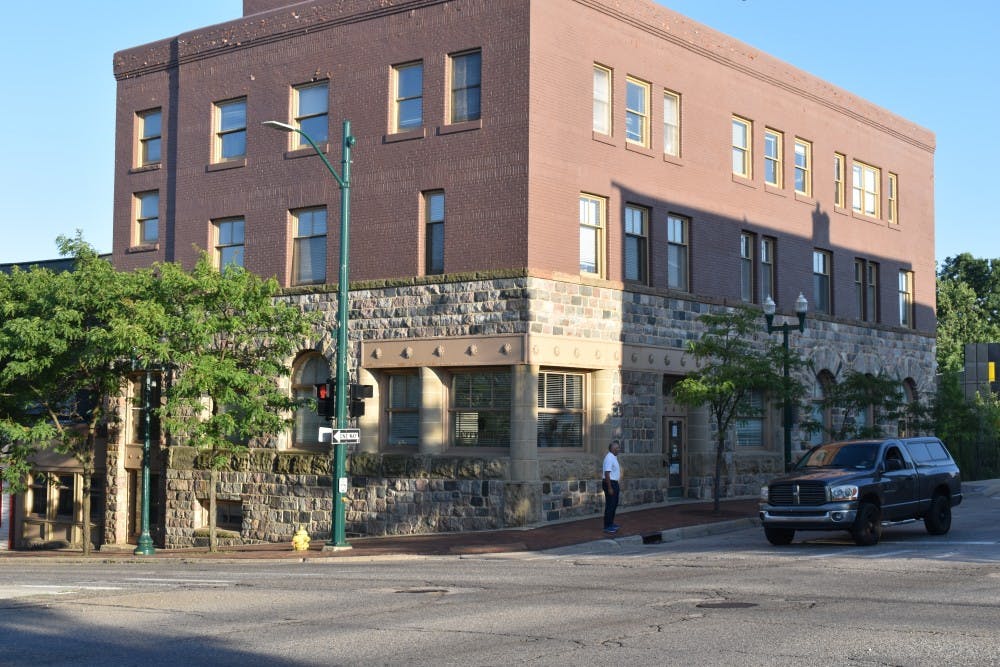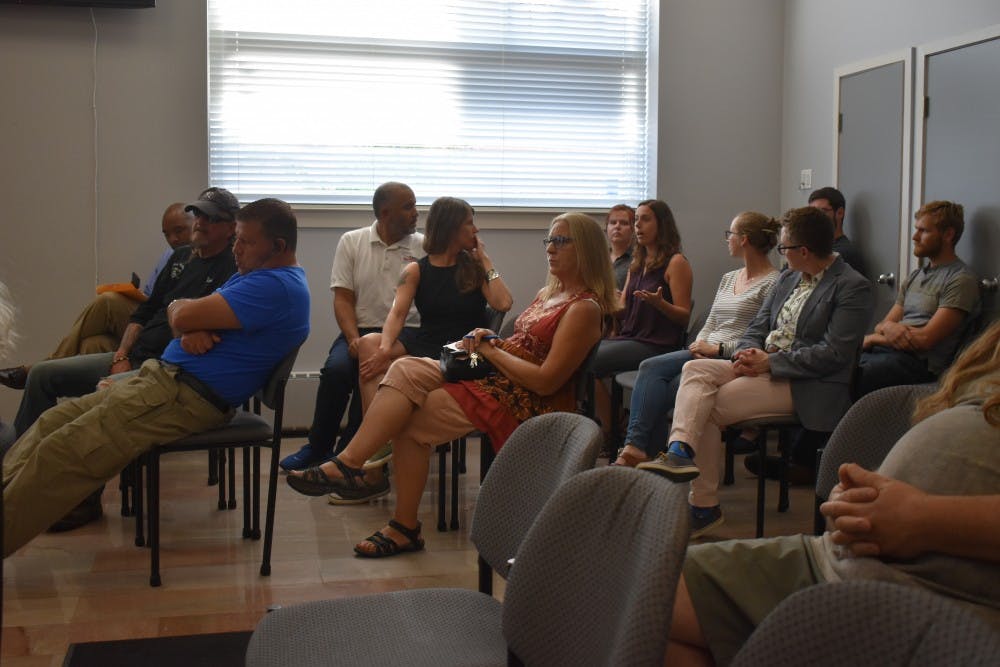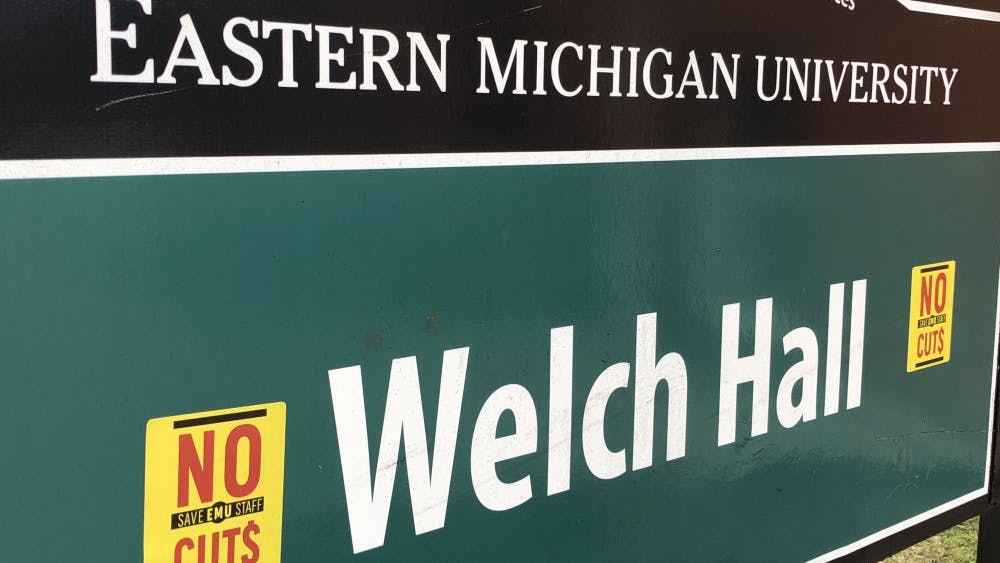Council Member Annie Somerville and social equity activist Chris Jackson hosted the City of Ypsilanti’s first town hall about recreational marijuana use and corresponding social equity plan on August 8, 2019. Residents filed into City Hall at 6 p.m. to participate in the discussion.

The reason for this gathering, according to Council Member Somerville, was because Ypsilanti was named as a disproportionately impacted community under the social equity plan in Proposal 1.
“Council hasn’t officially discussed recreational marijuana,“ Somerville explained. Her plan is to take the information gathered during this town hall into the first council discussion.

Council Member Annie Somerville hosted the first City Town Hall discussion about the social equity plan written into Proposal 1, which city voters overwhelmingly approved in 2018.
Proposal 1, passed in 2018, allows residents the ability to possess and use marijuana recreationally as well as apply for marijuana business permits. Within the proposal was the call for a social equity plan. The Michigan Regulatory Agency (MRA) later identified 19 communities under this plan that were deemed disproportionately impacted by the previous marijuana criminal legislation. This determination was made by comparing arrest records and poverty data across Michigan. Along with Ypsilanti, Detroit was included on the list.
These 19 communities will receive additional benefits and assistance from state employees as they enter the process of obtaining marijuana business and event permits. Along with assistance through the application process, some residents in these communities can receive up to 60% off of the application fee. In order to qualify for this program a resident must have lived in one of the 19 disproportionately impacted communities for five years before applying.
Council Member Somerville led the discussion, which covered a wide range of topics with a diverse group of community members. Besides city residents, current and prospective marijuana business owners were in attendance as well as representatives from other disproportionately impacted communities and healthcare professionals. One thing everyone had in common, however, was their affinity for the industry (this was verified by a show of hands).

Community members filed into Ypsilanti City Hall on August 8, 2019 to join the discussion about recreational marijuana businesses and how the city can fulfill the social equity plan written into Proposal 1.
The most pressing issue was how to ensure that the community meets the social equity expectations. Council Member Somerville shared concerns that the industry could end up lining the pockets of organizations outside of the community, with no loyalty to the residents.
“We want to put the money back into the community,“ she said.
Some recommendations from the gallery included ease of property taxes and assistance from the city in obtaining property for new businesses. Another popular idea was the creation of a local business directory that the marijuana industry can support by utilizing their services. A variety of other local businesses could be tapped for this directory, such as construction, plumbing, and marketing. By supporting other community businesses, the local economy can benefit from the rise of this new industry.
There were concerns around how the social equity plan will benefit the people that have traditionally been the disproportionately impacted by criminal marijuana laws. One thing the crowd agreed on is that, even with a 60% application discount, it is still financially implausible for some community members to join the industry. Low-interest loans and discounts on building permits and inspection fees were also discussed.
Chris Jackson, part-owner of Sticky Ypsi, agreed with the community member’s concerns.
“It’s going to be a problem to get traditional ways of funding,“ Jackson said. "There isn’t a robust system yet, and that’s part of the issue. It’s still going to take $200,000 potentially ... to successfully have a business.”

Council Member Somerville also mentioned the possibility of including people in communities outside of the direct city that could still qualify under the social equity program. Areas such as Ypsilanti Township were mentioned as possibly being included in the city’s plan. She also supported the idea of requiring businesses to hire a certain percentage of local workers in order to operate within the community.
“The good news is we’re starting from scratch,“ Somerville said. This leaves a lot of room for the city to make responsible decisions for the members of the community.
A final thought from the audience was how we can validate the reality that people are still incarcerated and still being held accountable for outdated marijuana prohibition laws. As we discuss the issue of social equity, how do we move past this as a community?
Council Member Somerville acknowledged the irony, announcing the introduction of recent legislation by Jeff Irwin to rectify these prior convictions and assist in clearing criminal records. This announcement was met with a round of applause from the gallery.
Wrapping up the meeting, Council Member Somerville reminded the community to stay involved in the conversation. Noting that there is often one vocal group of voices at the city council meetings, she warned that voice is not always representative of how the community reacts or votes.
Community members should stay tuned to updates from the city. .
You can subscribe to updates from the City of Ypsilanti at their website.










